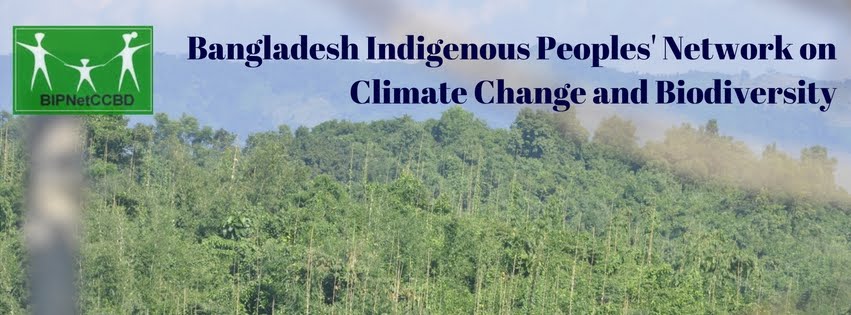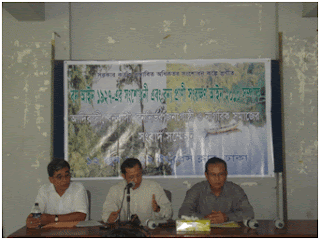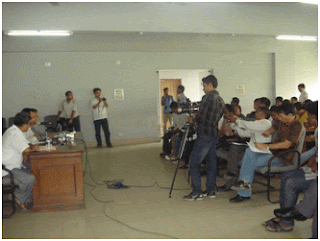
Staff Correspondent Dhaka | Saturday| 12 November 2011 |A
platform of five non-government organisations on Friday demanded right
to internal and international movement, relocation and rehabilitation of
people displaced due to climate change.
The rights group made
the demand at a press conference on ‘Expectation from climate vulnerable
forum: right to survive is not negotiable’ at the National Press Club.
The
rights group comprises networks of Bangladesh Indigenous People Network
on Climate Change and Biodiversity (BIPNet), Climate Change Development
Forum (CCDF), Campaign for Sustainable Rural Livelihood (CSRL), Equity
and Justice Working Group Bangladesh (EquityBD) and Network on Climate
Change Bangladesh (NCCB).
While moderating the press conference,
Member Secretary of CSRL Ziaul Hoque Mukta said Climate Vulnerable Forum
(CVF), a group of 26 vulnerable countries, has an opportunity to put
pressure on developed countries to support the people affected by the
climate change.
Steering Committee Member of CSRL Ahsan Uddin
said lives of over a billion people are at stake due to climate change.
These people have every right to live on earth, he said adding that CVF
must raise voice on behalf of the vulnerable people.
Ziaul Hoque Mukta said ‘G77 and China’ have failed to protect rights of vulnerable people creating scope for CVF to do the jobs.
He said the third meeting of CVF will begin on Sunday in Dhaka.
“We
urge the participating countries to make CVF a formal negotiating
platform in the UN Framework Convention on Climate Change (UNFCCC)
processes to ensure the right to survive of over a billion most
vulnerable people on earth,” Ziaul Hoque added.
He said to this end UNFCCC will start negotiations from 28 November to 9 December 2011 in Durban, South Africa.
The rights group demanded that CVF must raise the voice to keep the world temperature within 1.5 degree Celsius by 2015.
They
suggested that CVF should demand imposition of levy on the shipping and
aviation sector to earn money to support the vulnerable countries.
The
group declared series campaign both in Dhaka and countrywide in this
relation, there is a postcard campaign, a youth rally on 12th Nov, and a
human chain in Dhaka and all the coastal districts on 13th to draw
attention people’s attention to CVF and also of the UN Secretary General
who is expected to participate in CVF.
Among others, Rezaul
Karim Chowdhury of EquityBD, Mizanur Rahamn Bijoy of NCCB and Sudipta
Chakma of BIPNet spoke at the function. http://www.daily-sun.com/details_ds-rehabilitation-of-climate-refugees-demanded_390_1_10_1_5.html-------------------------------------
Rights groups for CVF to emerge as independent negotiation group
Rights
groups have urged the climate vulnerable countries to emerge as
independent negotiation group in United Nations Framework Convention on
Climate Change (UNFCCC), freeing themselves from the interest of G-77
plus China, reports UNB.
An alliance of five rights groups made
the call at a press conference at National Press Club Friday on the eve
of the third meeting of the Climate Vulnerable Forum (CVF).
UN Secretary General Ban Ki-moon will attend the conference to be held in Dhaka on November 13-14 (Sunday-Monday).
The
alliance comprises Bangladesh Indigenous People Network on Climate
Change and Biodiversity (BIPNet), Climate Change Development Forum
(CCDF), Campaign for Sustainable Rural Livelihood (CSRL), Equity and
Justice Working Group Bangladesh (EquityBD), and Network on Climate
Change Bangladesh (NCCB).
Dr Ahsan Uddin of CSRL read out a
written statement at the press conference while Ziaul Hoque Mukta of
CSRL, Rezaul Karim Chowdhury of EquityBD, Mizanur Rahman Bijoy of NCCB,
and Sudipta Chakma of BIPNet also spoke.
Dr Ahsan Uddin said that
as G-77 plus China grouping in UNFCCC has not succeeded to reflect the
demands of the countries most vulnerable to climate change, the CVF
should emerge as independent negotiation group in the UNFCCC to reflect
the demands of the 52 climate vulnerable countries of Asia, Africa and
Latin America.
He said the CVF must raise voice to bring the
high-emitter developing countries like Brazil, India, Mexico and South
Africa under legal binding for mitigation.
The climate vulnerable
countries, he added, must raise their voice to keep the world
temperature within 1.5 degrees Celsius, and limit greenhouse gas
emission to 350 ppm (parts per million), while developed countries is
demanding to keep temperature at 2 degrees Celsius.
Ahsan Uddin
said the CVF should press for a new UN protocol for climate induced
migrants to facilitate their resettlement, rehabilitation and
reintegration.
He also suggested the CVF to demand all climate
finance from the developed countries, which are mainly responsible for
global warming and climate change.
The group declared a series of
campaigns both in Dhaka and countrywide. There will be a postcard-based
campaign and a youth rally in Dhaka on Saturday (Nov 12), and also a
human chain in Dhaka and all the coastal districts on Sunday (Nov 13) to
draw attention of the CVF and the UN Secretary General. http://www.fe-bd.com/more.php?news_id=155664&date=2011-11-12-----------------------------------------------------
Negotiation on climate change impacts
CVF should emerge as independent group
Rights
groups have urged the climate vulnerable countries to emerge as
independent negotiation group in United Nations Framework Convention on
Climate Change (UNFCCC), freeing themselves from the interest of G-77
plus China, reports UNB.
An alliance of five rights groups made the
call at a press conference at National Press Club here Friday on the eve
of the third meeting of the Climate Vulnerable Forum (CVF). UN
Secretary General Ban Ki-moon will attend the conference to be held in
Dhaka on November 13-14 (Sunday-Monday).
The alliance comprises
Bangladesh Indigenous People Network on Climate Change and Biodiversity
(BIPNet), Climate Change Development Forum (CCDF), Campaign for
Sustainable Rural Livelihood (CSRL), Equity and Justice Working Group
Bangladesh (EquityBD), and Network on Climate Change Bangladesh (NCCB).
Dr
Ahsan Uddin of CSRL read out a written statement at the press
conference while Ziaul Hoque Mukta of CSRL, Rezaul Karim Chowdhury of
EquityBD, Mizanur Rahamn Bijoy of NCCB, and Sudipta Chakma of BIPNet
also spoke.
Dr Ahsan Uddin said that as G-77 plus China grouping in
UNFCCC has not succeeded to reflect the demands of the countries most
vulnerable to climate change, the CVF should emerge as independent
negotiation group in the UNFCCC to reflect the demands of the 52 climate
vulnerable countries of Asia, Africa and Latin America. He said the CVF
must raise voice to bring the high-emitter developing countries like
Brazil, India, Mexico and South Africa under legal binding for
mitigation.
The climate vulnerable countries, he added, must raise
their voice to keep the world temperature within 1.5 degree Celsius, and
limit greenhouse gas emission to 350 ppm (parts per million), while
developed countries is demanding to keep temperature at 2 degree
Celsius.
Dr Ahsan said the CVF should press for a new UN protocol for
climate induced migrants to facilitate their resettlement,
rehabilitation and reintegration.
He also suggested the CVF to demand
all climate finance from the developed countries, which are mainly
responsible for global warming and climate change.
The group declared
a series of campaigns both in Dhaka and countrywide. There will be a
postcard-based campaign and a youth rally in Dhaka on Saturday (Nov 12),
and also a human chain in Dhaka and all the coastal districts on Sunday
(Nov 13) to draw attention of the CVF and the UN Secretary General.
http://www.newstoday.com.bd/index.php?option=details&news_id=44059&date=2011-11-12------------------------------------------------------------------------------------------------------------CVF Urged as Independent Negotiation Group in UNFCCCDhaka,
11th November 2011. Today in a press conference five rights group
alliances on the eve of Climate Vulnerable Forum (CVF), the CVF comprise
most vulnerable countries having its third conference in the capital
during 13th and 14th November, also be attended by UN Secretary General
Ban Ki Moon, urged that the CVF should emerge as independent negotiation
group in UNFCCC, freeing themselves from the interest of G-77 +China.
The rights group comprises networks of Bangladesh Indigenous People
Network on Climate Change and Biodiversity (BIPNet), Climate Change
Development Forum (CCDF), Campaign for Sustainable Rural Livelihood
(CSRL), Equity and Justice Working Group Bangladesh (EquityBD) and
Network on Climate Change Bangladesh (NCCB), the expectations was also
supported by 350.org . The press conference was moderated by Ziaul Hoque
Mukta of CSRL, a written statement of the group read out by Dr. Ahsan
Uddin of CSRL, others speakers of the press conference were Rezaul Karim
Chowdhury of EquityBD, Mizanur Rahamn Bijoy of NCCB and Sudipta Chakma
of BIPNet.http://www.equitybd.org/campaigns/climatejustice/climatefinancemonitoring/cvf-urged-as-independent-negotiation-group-in-unfccc#.Tr0vWfvQUHs.facebook
-----------------------------------------------------------------------------------------------------------------------------------------------------------------
Rights groups urge CVF to work independently
Staff Correspondent
Five
rights groups on Friday demanded that the Climate Vulnerable Forum
should emerge as an independent negotiation group in the United Nations.
The
group that includes organisation like BIPNet, CCDF, CSRL, EquityBD and
NCCB at a press conference in Dhaka also announced a series of
programmes during the CVF’s forthcoming meeting in Dhaka in November
13-14.
The meeting will be attended, among others, by the UN secretary general, Ban Ki Moon.
The
Climate Vulnerable Forum, now working under G-77, was founded in
November 2009 as a group of nation states to act together on common
concerns of human-induced global climate change.
A
post card campaign, youth rally and human chain are part of the
programmes chalked out by the rights group in Dhaka and all the coastal
districts to draw the attention of the international community,
representatives of the groups told the press conference.
CSRL’s
Ahsan Uddin read out a written statement at the conference which was
also addressed by EquityBD’s Rezaul Karim Chowdhury, NCCB’s Mizanur
Rahamn Bijoy and BIPNet’s Sudipta Chakma.
The
rights group representatives said new levy should be imposed on
international aviation and shipping for mobilisation of climate finance.
DHAKA,
NOV 11: Rights groups urged the climate vulnerable countries to emerge
as independent negotiation group in United Nations Framework Convention
on Climate Change (UNFCCC), freeing themselves from the interest of G-77
plus China. An alliance of five rights groups made the call at a press
conference at National Press Club here on Friday on the eve of the third
meeting of the Climate Vulnerable Forum (CVF). UN Secretary General Ban
Ki-moon will attend the conference in Dhaka on November 13-14.
The
alliance comprises Bangladesh Indigenous People Network on Climate
Change and Biodiversity (BIPNet), Climate Change Development Forum
(CCDF), Campaign for Sustainable Rural Livelihood (CSRL), Equity and
Justice Working Group Bangladesh (EquityBD), and Network on Climate
Change Bangladesh (NCCB).
Dr Ahsan Uddin of CSRL read out a written
statement at the press conference while Ziaul Hoque Mukta of CSRL,
Rezaul Karim Chowdhury of EquityBD, Mizanur Rahamn Bijoy of NCCB and
Sudipta Chakma of BIPNet also spoke. Dr Ahsan Uddin said as G-77 plus
China grouping in UNFCCC has not succeeded to reflect the demands of the
countries most vulnerable to climate change, the CVF should emerge as
independent negotiation group in the UNFCCC to reflect the demands of
the 52 climate vulnerable countries of Asia, Africa and Latin America.
UNB
-----------------------------------------------------------------------------------------------------------

Rights
group activitists collecting mass signature in front of National Press
Club in the city on Friday to urge the CVF to act as independent
negotiation group in UNFCCC.
CVF urged to act as independent negotiation group in UNFCCC
Business Report
Speakers
in a press conference on Friday urged that Climate Vulnerable Forum
(CVF) should emerge as independent negotiation group in UNFCCC, freeing
themselves from the interest of G-77 and China. Five rights group
comprising networks of Bangladesh Indigenous People Network on Climate
Change and Biodiversity (BIPNet), Climate Change Development Forum
(CCDF), Campaign for Sustainable Rural Livelihood (CSRL), Equity and
Justice Working Group Bangladesh (EquityBD) and Network on Climate
Change Bangladesh (NCCB) organized the conference.
The CVF comprises
most vulnerable countries having its third conference in the capital
during 13th and 14th this month that was said to be attended by UN
Secretary General Ban Ki Moon.
The group declared series campaign
both in Dhaka and country wide in this relation, there will be a post
card campaign, a youth rally today and a human chain in the capital and
all the coastal districts on 13th for drawing attention of the CVF and
also of the UN Secretary General.
-------------------------------------------------------------------------------------------------------------
Climate meet in Dhaka from Sunday
Dhaka,
Nov 10 (bdnews24.com)—A 'Climate Vulnerable Forum' Conference, aiming
for a consensus on securing compensation for countries vulnerable to
climate change, will begin in Dhaka on Sunday.
State
minister for forest and environment Hasan Mahmud said on Thursday the
conference will be held at the Pan Pacific Sonargaon Hotel on Nov 13-14.
The
minister added that Ban Ki-moon, UN secretary-general, and prime
minister Sheikh Hasina will be in attendance on the final day.
Co-organised
by the foreign and environment ministries, 26 countries vulnerable to
climate change will be participating in the CVF while another 26 will be
observers. Delegates from World Bank, the Commonwealth and about 20
international agencies will attend it.
The
state minister said one objective of the conference will be to reach a
legally binding deal for the reduction of carbon emissions. According to
the minister, the CVM will work towards an agreement to secure
compensation for the susceptible countries.
Bangladesh has already been recognised in the international forum as the most vulnerable to climate change.
The
junior minister said until now, a deal has been made to receive
assistance worth $15 million with another $100 million in the pipeline
from the developed countries.
The
Climate Vulnerable Forum (CVFG) was first formed by countries affected
by climate change at Male in 2009. Two conferences, one in New York and
the other in the Caribbean, have been held since.
Mahmud
said the affected countries will make their demand for what they are
entitled to receive from the developed countries in the upcoming Durban
Conference. A Dhaka Declaration is expected to be issued at the end of
the conference.
Bangladesh
as the most affected country has called for financial and technical
assistance from the developed countries that are responsible for
increased carbon emissions leading to climate change.
The
state minister said the developed countries were yet to clear the
process of providing assistance and technology transfer, and therefore
the vulnerable countries would claim the compensation through consensus.
He
pointed out that countries like Bangladesh were victims of the carbon
emissions responsible for climate change. Bangladesh emits 0.03 tons of
carbon a year, which is even lower than the average emission of 1.6 tons
a year by other developing countries. The developed nations emit 15 to
20 tons of carbon a year.
bdnews24.com/sha/mah/tk/bd/1531h























